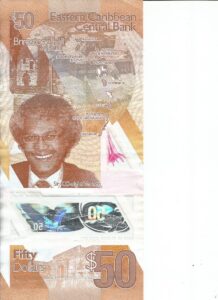
Article by Laurel Bain.
The late Sir K Dwight Venner, who served as Governor of the Eastern Caribbean Central Bank [ECCB] from 1989 to 2015, contributed significantly to the development of the ECCB and the Eastern Caribbean Currency Union [ECCU].
Sir K Dwight Venner was a visionary leader, and a strong advocate for the OECS Economic Union, while, at the same time, protecting and defending the strong and stable Eastern Caribbean [EC] dollar. Sir K Dwight Venner constantly withstood the pressures to devalue the EC dollar.
During a consultative engagement, when asked by a representative of an international institution whether the appreciation of the EC dollar wakes him up at nights, Governor Venner’s response was: ‘I do not sleep at nights’. This closed all further discussions on the devaluation of the EC dollar.
Governor Venner was a regionalist. On becoming Governor of the ECCB, the regional nature of the Bank was upgraded. After the construction of the Headquarter building in 1994, the flag of all the member countries of the ECCB were prominently featured on the compound. Regional institutions, such as the Eastern Caribbean Stock Exchange [ECSE] and the Eastern Caribbean Home Mortgage Bank [ECHMB], were facilitated along with the development of the Regional Government Securities Market [RGSM].
The institutions were housed at the ECCB Headquarters, and their staff participated in the economic and social activities of the ECCB in keeping with the spirit of deepening regional integration. In promoting the regional integration vision, the ECCB accommodated a flag raising ceremony on the date of independence of each country with the singing of the National Anthem, and the display of culture and products of the island. The economic and cultural display of the islands were reinforced by the institutionalization of Island Night.
The performance of the Grenadian contingent at the Bank was of added interest to Sir K Dwight Venner. Governor Venner was a proud student of the Grenada Boys Secondary School [GBSS], so the display of Grenadian talents and culture had to be upscaled. On one of the Island Night, the Grenadian contingent displayed the economic, political and social life in Grenada in a medley of songs and dances, with the songs featuring memorable lyrics of: ‘ When you see me in the cold mountain, what a planting…; Island in the sun with beautiful beaches and lovely people…; We shall never let our leader fall…; Forward march against imperialism…; and Dry weather house doh worth a cent….’With Arthur Campbell, a currently well-known entrepreneur, as the guitarist, the performance climaxed with the singing of the song with the lyrics: I must go back, my little island is calling me, by the now Honourable Lenox Andrews.
This was followed by the sharing of oil down from a big iron pot which was brought up from Grenada specifically for the cooking of the oil down. The now Honourable Dennis Cornwall efficiently managed the cooking of the oil down, a dish which became famous at the ECCB. On another occasion, the Grenadian contingent imported the talent in the form of the late Mighty Defender who sang about the stability of the EC dollar. With the experiences of regionalism, it is hoped that the Ministers of Government who were part of the process would continue to push for the strengthening of the OECS Economic Union.
Sir K Dwight Venner was an ardent researcher and with the support of the late Ms. Alison Phills, the ECCB librarian, a first-class library was developed at the ECCB. Ms. Phills, with the support of the library staff, meticulously sourced, recorded and organized the documents in the library; managed the collection of scholarly journals; sourced the newspapers from each member country of the ECCB; managed the exchange of documents with the staff of the Bank; archived the historical records; and embraced the move to the electronic platforms. Based on her interactions, Ms. Phills was concerned about the information gap that existed on the ECCB. This motivated her to publish the first book on the history of the ECCB entitled ‘The Eastern Caribbean Central Bank: Some Key Historical Facts’, which was launched on 21st February 2019.
The gathering of information and the sharing of knowledge were common to Sir K Dwight Venner and Ms. Alison Phills. On request, Ms. Phills organized Governor Venner’s quiet research time in the library. Thereafter, Governor Venner and Ms. Phills would converse as they shared some commonalities namely, the interest in information, the same birthday of 21 January, and the same nationality of St Vincent and the Grenadines.
May the legacy of Sir K Dwight Venner and Ms. Alison Phills live on.
By Ms. Laurel Bain who served at the ECCB for over twenty-five years along with the late Sir K Dwight Venner and the late Ms. Alison Phills. January 2023.
